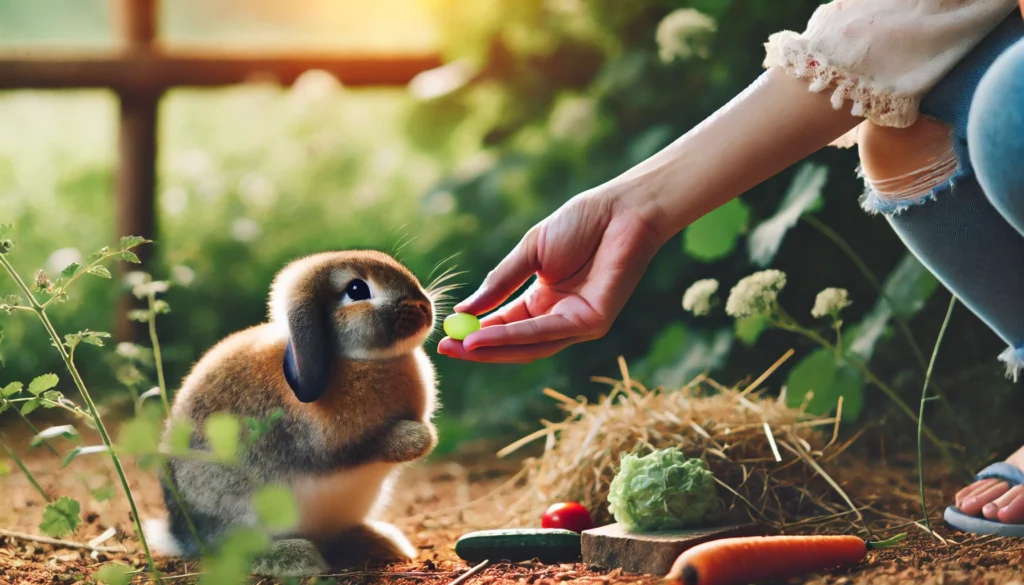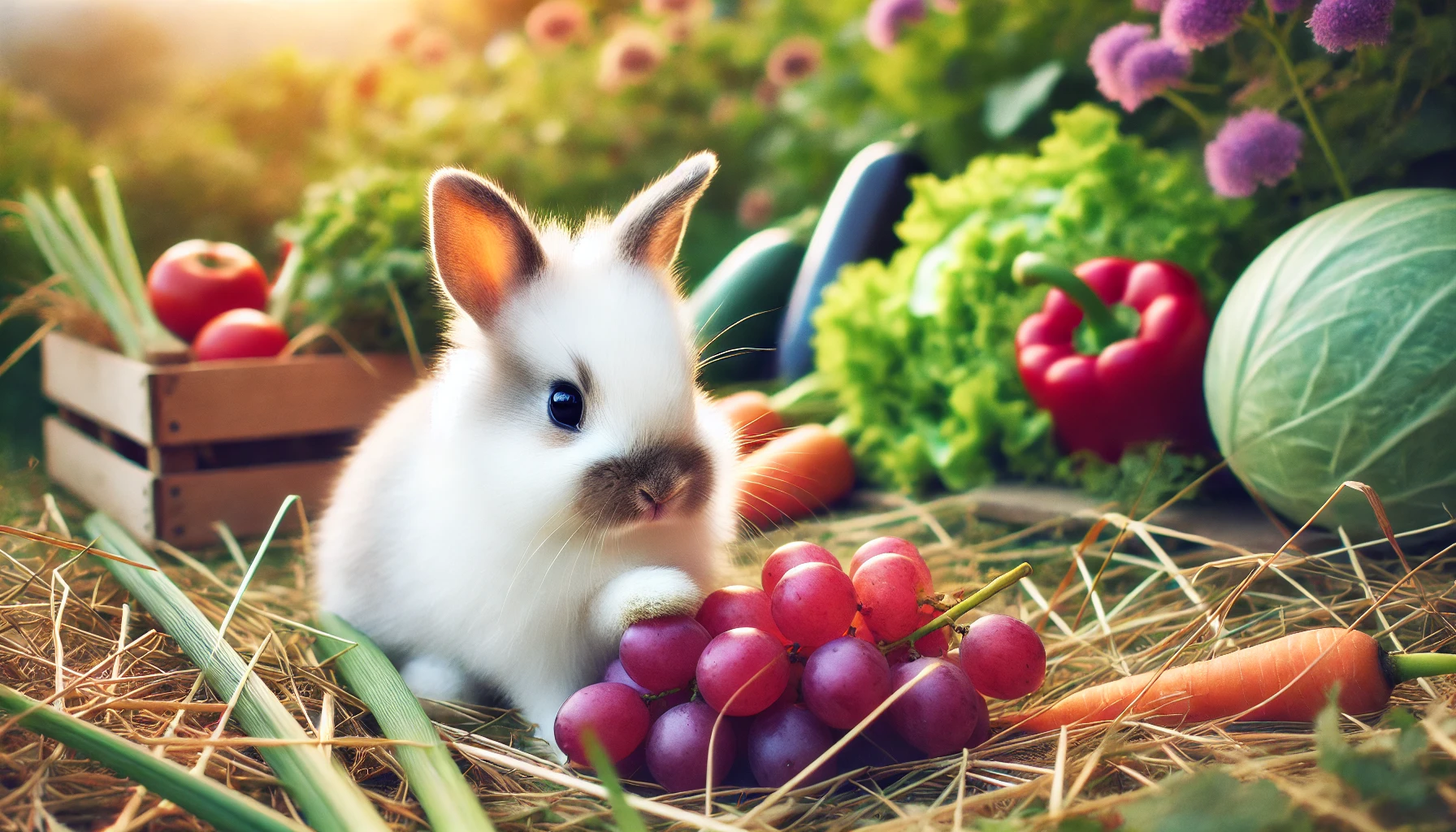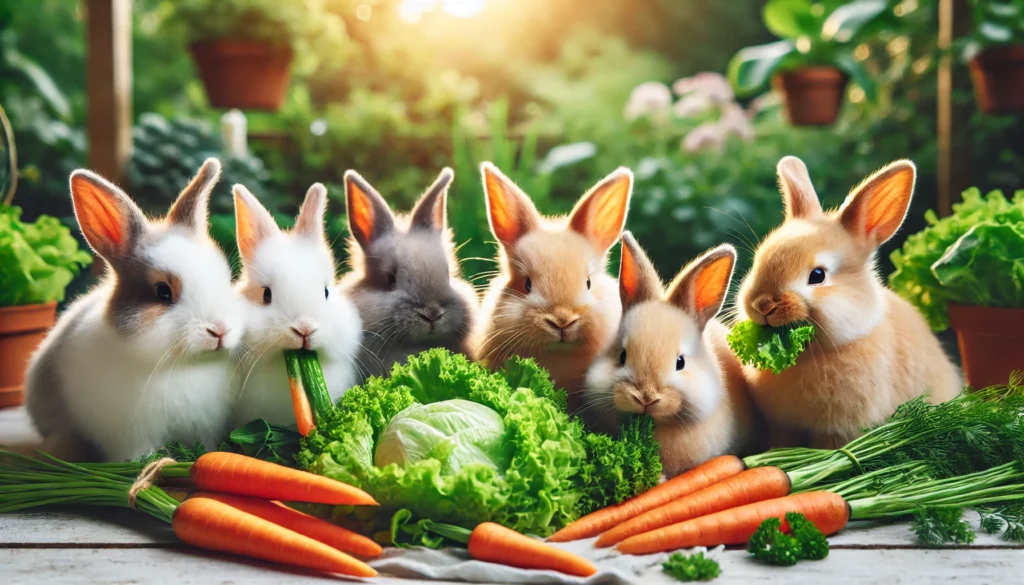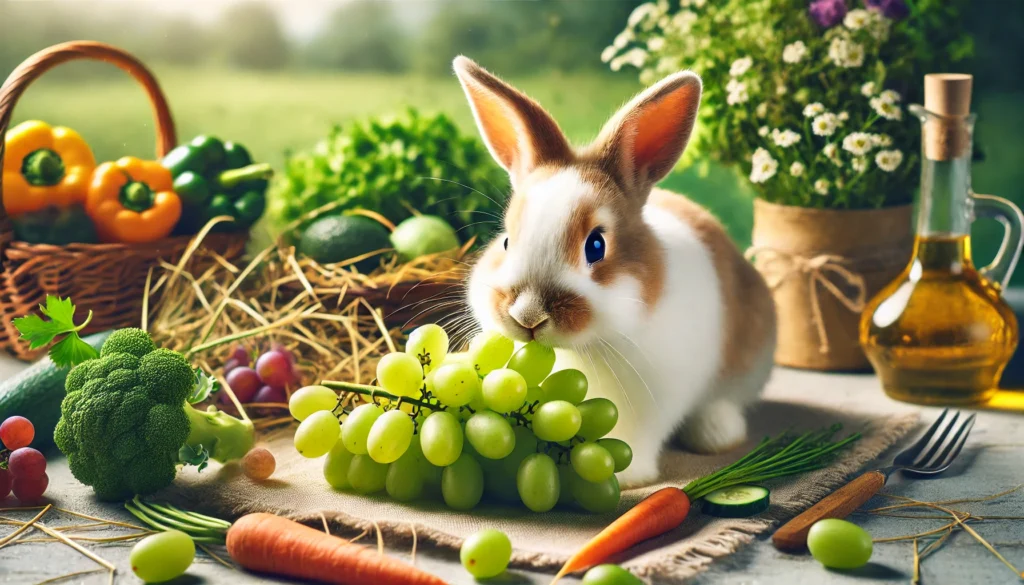Owning a rabbit is a rewarding experience. These fluffy little companions bring joy to many households, and as responsible pet owners, we want to ensure they are healthy and happy. Naturally, one question that arises is, “Can rabbits eat grapes?” Yes, but there are a few important guidelines to keep in mind. In this blog, we’ll explore the benefits, risks, and how to properly incorporate grapes into your rabbit’s diet.
Understanding a Healthy Rabbit Diet
Before we dive into whether or not grapes are safe for rabbits, it’s essential to understand the foundation of a healthy rabbit diet. Rabbits have very specific dietary needs to maintain their digestive health and overall well-being.
A Hay-Based Diet
The core of a rabbit’s diet should consist mainly of hay, such as mixed grass hay or Timothy hay. This provides the fiber rabbits need to maintain proper digestion. Hay is rich in nutrients like vitamins A and B, calcium, and protein, essential for their health. Feeding your rabbit plenty of hay also helps keep their teeth worn down since they grow continuously.
Adding Leafy Greens
In addition to hay, leafy greens are another vital component of a rabbit’s diet. About 80% of all fresh foods offered to rabbits should be leafy greens. A good rule of thumb is to feed your rabbit 1 cup of leafy greens for every 2 pounds of body weight.
When selecting greens, avoid those with high levels of oxalic acid, such as spinach, mustard greens, and parsley, as these can be harmful in large quantities. Instead, opt for rabbit-safe greens like romaine lettuce, cilantro, and dandelion greens.
Other Vegetables
Beyond leafy greens, rabbits can eat certain root vegetables and flowers like broccoli, cauliflower, and bell peppers. These should be given in smaller quantities compared to leafy greens because of their higher sugar and starch content. A safe amount is about one tablespoon of these vegetables per 2 pounds of rabbit weight daily.
So, Can Rabbits Eat Grapes?
Now that we understand the basics of a healthy rabbit diet, let’s address the main question: Can rabbits eat grapes? Yes, but only in moderation as an occasional treat. Grapes are safe for rabbits to eat in small amounts, but due to their high sugar content, they should not be a regular part of your rabbit’s diet.
How Many Grapes Can You Feed a Rabbit?
It’s essential to limit how many grapes you feed your rabbit. One or two small grapes, given once or twice a week, are plenty. For smaller rabbits, you might want to cut the grapes into halves or quarters to avoid choking hazards. Too many grapes can lead to digestive issues and other health problems, which we’ll explore in more detail below.

Benefits of Feeding Grapes to Rabbits
Although grapes are high in sugar, they do offer some benefits when given in moderation. Here are some of the potential health perks:
1. Antioxidants
Grapes contain antioxidants, which help protect your rabbit’s cells from damage and may lower the risk of certain diseases. Antioxidants are essential for keeping your rabbit healthy and can support their immune system.
2. Vitamins and Minerals
Grapes provide vitamins C and K, which contribute to your rabbit’s overall health. While rabbits don’t need extra vitamin C like some other animals, the addition of vitamins from fresh fruits is still a plus in moderation.
3. Hydration
Grapes have a high water content, which can help keep your rabbit hydrated. Rabbits can sometimes benefit from extra water, especially in warmer climates.
4. Enrichment
Feeding your rabbit grapes as a treat can provide enrichment and stimulate their curiosity. Giving them a new flavor or texture keeps their diet exciting and encourages natural behaviors like foraging.
Risks of Feeding Grapes to Rabbits
While grapes can be a tasty treat for your rabbit, there are several risks associated with feeding them too frequently or in large quantities. Here are the key things to be cautious about:
1. High Sugar Content
The biggest concern with feeding grapes is their high sugar content. Rabbits have delicate digestive systems that are designed to process fibrous foods like hay, not sugary fruits. Too much sugar can lead to digestive issues such as diarrhea, gas, and bloating. In the long term, excessive sugar intake can cause obesity and other health problems.
2. Dental Issues
Like humans, rabbits can suffer from dental problems. Feeding your rabbit sugary treats like grapes too often can lead to tooth decay. Rabbits need to chew on fibrous foods to naturally wear down their teeth. Soft, sugary foods can contribute to plaque build-up and dental disease.
3. Digestive Upset
Rabbits have very sensitive digestive systems. A sudden increase in sugary foods like grapes can disrupt the balance of good bacteria in their gut, causing digestive upset. Symptoms of this might include diarrhea or a decrease in appetite, which can lead to more serious health concerns if not addressed.
4. Risk of Obesity
Since grapes are high in sugar and low in fiber, feeding them too often can lead to weight gain. Overweight rabbits can suffer from joint problems, reduced mobility, and even heart disease. It’s important to monitor your rabbit’s weight and ensure they are getting enough exercise to stay healthy.
5. Choking Hazards
While grape seeds are not toxic, they can pose a choking hazard to your rabbit. Always feed seedless grapes to your rabbit, and if possible, cut them into smaller pieces to prevent any accidents.
How to Safely Feed Grapes to Your Rabbit
If you decide to feed grapes to your rabbit, here are a few guidelines to ensure their safety:
- Limit portions: Only give your rabbit one or two small grapes per serving, and limit the frequency to once or twice a week.
- Cut grapes: For smaller rabbits, consider cutting grapes in half or quarters to avoid choking hazards.
- Wash thoroughly: Be sure to wash grapes before feeding them to your rabbit. This removes pesticides or chemicals that could harm your pet.
- Check for seeds: Always choose seedless grapes to avoid the risk of choking or digestive blockages.
Alternatives to Grapes for Rabbits
If you’re looking for other treatment options for your rabbit, many fruits and vegetables are safe in moderation. Some good alternatives to grapes include:
- Apples (without seeds)
- Bananas (in small pieces)
- Blueberries
- Strawberries
- Melons
Just like grapes, these fruits should only be fed occasionally and in small amounts.
What Should Rabbits Eat Daily?
While treats like grapes are fun, it’s crucial to remember that most of your rabbit’s diet should be healthy and fiber-rich. A well-balanced rabbit diet includes:
- Hay: Unlimited amounts of high-quality hay like Timothy hay should be the foundation of your rabbit’s diet. It promotes healthy digestion and keeps their teeth in good condition.
- Fresh Vegetables: Leafy greens like romaine lettuce, cilantro, and parsley should be fed daily.
- Pellets: High-quality rabbit pellets can supplement their diet but should be given in small quantities (about ¼ cup per 5 pounds of body weight).
Conclusion
So, can rabbits eat grapes? Yes, but with caution. Grapes are safe for rabbits when fed as an occasional treat in small amounts. However, due to their high sugar content, grapes should never replace the essential components of a rabbit’s diet, such as hay and leafy greens.
Always monitor your rabbit for any signs of digestive upset after introducing new foods, and consult your veterinarian if you have any concerns about your rabbit’s diet. By feeding grapes responsibly, you can offer your bunny a tasty and enriching treat without risking their health.
FAQs
- Are grapes safe for rabbits to eat?
Yes, grapes are safe for rabbits to eat, but only in moderation due to their high sugar content. - What fruits rabbits cannot eat?
Rabbits should avoid fruits like avocado, rhubarb, and unripe tomatoes, as these can be toxic to them. - Do rabbits eat watermelon?
Yes, rabbits can eat watermelon in small amounts, but avoid the seeds and rind due to potential digestive issues. - Can bunnies eat mango?
Yes, rabbits can eat mango, but only in small amounts as an occasional treat due to its high sugar content. - What is a bunny’s favorite fruit?
Many rabbits love fruits like apples (without seeds), bananas, and strawberries, but they should only be given sparingly. - Is banana safe for rabbits?
Yes, bananas are safe for rabbits, but they should be given in small quantities as they are high in sugar.




Leave a Reply